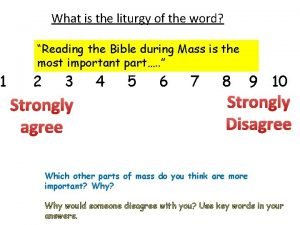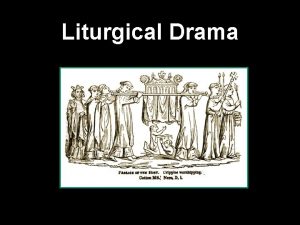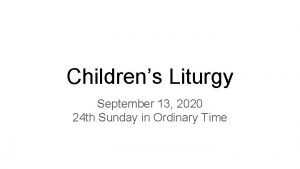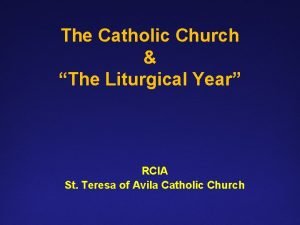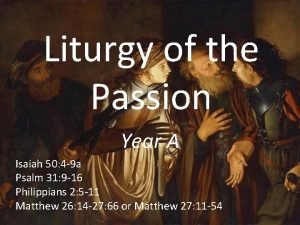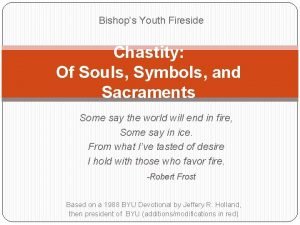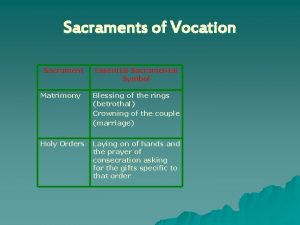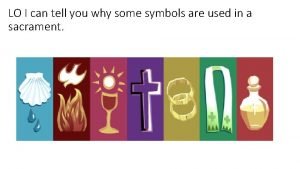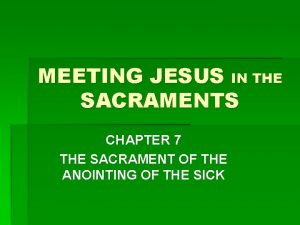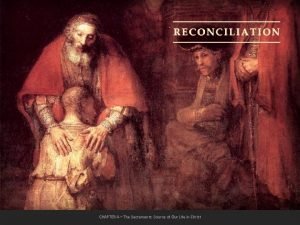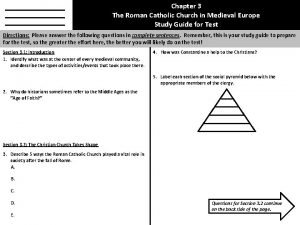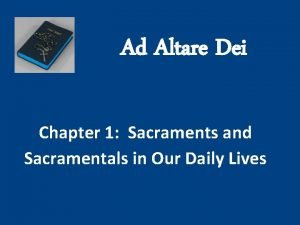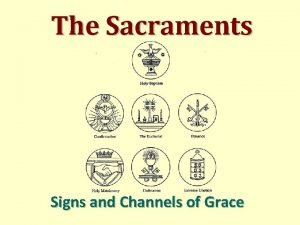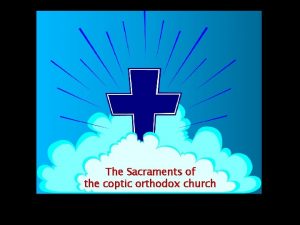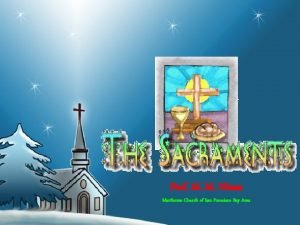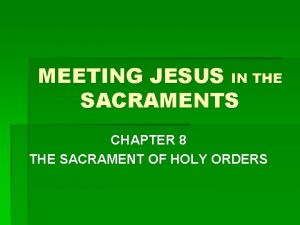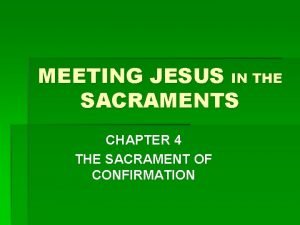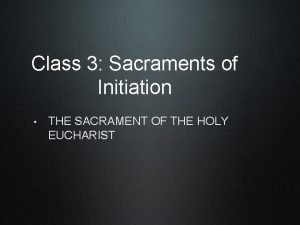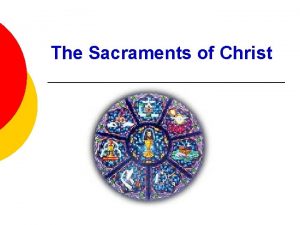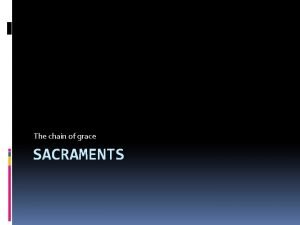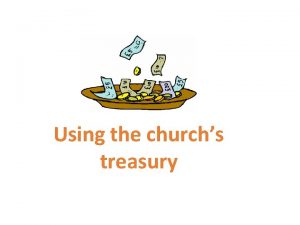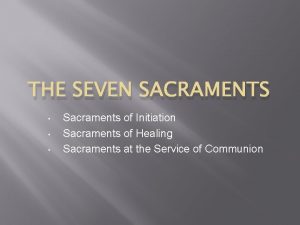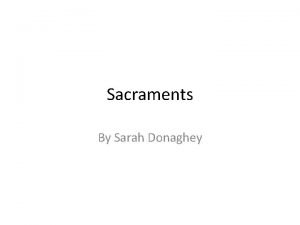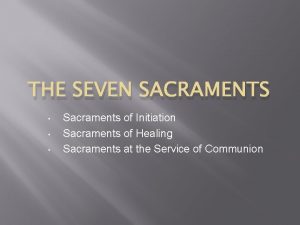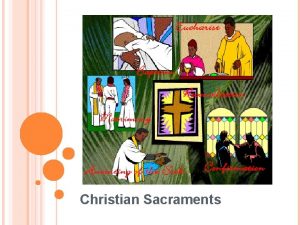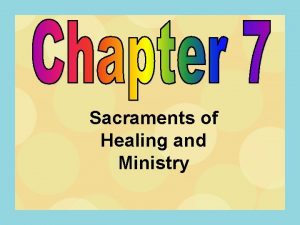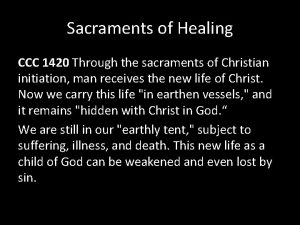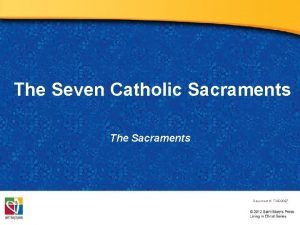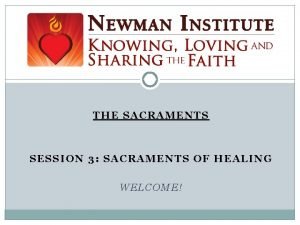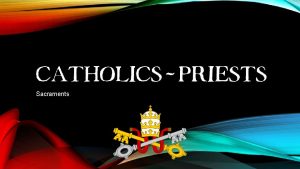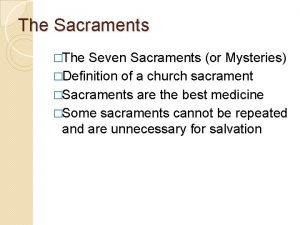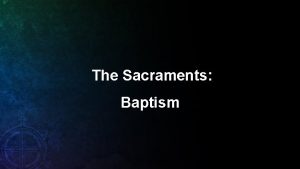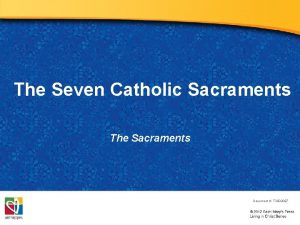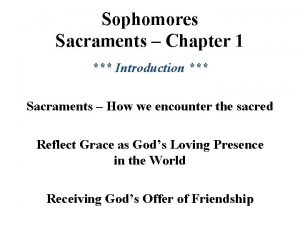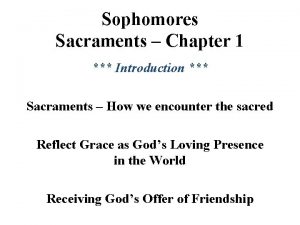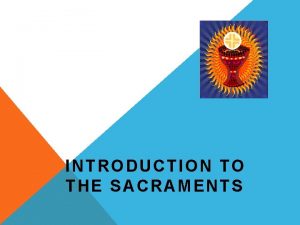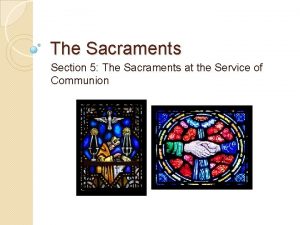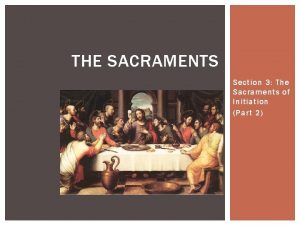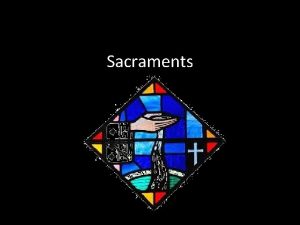LITURGY AND THE SACRAMENTS Liturgy is the Churchs
























- Slides: 24

LITURGY AND THE SACRAMENTS

Liturgy is the Church’s OFFICIAL PUBLIC COMMUNAL PRAYER (Sacraments, Funerals, Liturgy of the Hours)

OFFICIAL (a spontaneous prayer service is not official) PUBLIC (open to all) COMMUNAL (we worship as a COMMUNITY – equality, solidarity, cooperation) PRAYER (lifting up of our hearts to God)

Liturgical Books • Roman Missal • Used by the priest at Mass, contains all the prayers of the Mass • Lectionary for Mass • Contains the readings for Mass, first, second, responsorial psalm and gospel acclamations • Book of Gospels • Contains only the Gospels • Rite of Baptism for children • Contains the rituals necessary for baptism. Each sacrament and other blessings and consecrations has a separate book • Liturgy of the Hours • Readings, hymns and prayers for the seven “hours” of the day. There is a book for each “season” of the year

Liturgy is • God’s work of salvation in which we are called to participate • Ritual, repeated, meaningful symbols and actions • Decreed by Jesus “Do this in Memory of Me”

• Liturgy is the prayer of the Church, in heaven, on Earth and in Purgatory • We are connected to all of those outside of time and space, Mary, angels, saints, etc. • Communion of Saints: • Heaven • Earth • Purgatory • People on Earth pray for those in Purgatory, who get to Heaven, and then pray for those on Earth!

“Through Christ Our Lord” • Christ is present in all liturgy • In the ordained minister who acts in the person of Jesus. • In the assembly of people, as the “Body of Christ” • In the Scripture, the “Word of God” that is an essential element of every liturgy • In the Eucharist, in a special way, Jesus is truly present in Body and Blood

Trinitarian Doxology – Liturgy is Trinitarian Through Him, with Him, in Him, In the unity of the Holy Spirit, all glory and honor is yours, almighty Father, forever and ever. Amen.

Liturgical Calendar • Celebrates the whole of the Paschal Mystery, from the Incarnation to Pentecost Purple White/Gold Green Waiting, penance Joy Hope

• Advent: • Begins the Liturgical year • a time of preparation, 4 weeks (22 -28 days) before Christmas • To celebrate the birth of God made flesh • To celebrate Jesus coming into our own hearts • To prepare for the final coming of Jesus

Christmas: Begins on Dec. 25 th and ends with the Baptism of Jesus (3 rd Sunday after Christmas) Includes: Epiphany (aka Little Christmas/Three Kings Day) on the 12 th day of Christmas (revelation to the Gentiles) - 1/6* Feast of the Holy Innocents (12/28 – infants massacred by Herod), Feast of the Holy Family, and Feast of Mary, Mother of God (1/1)

• Ordinary Time I and II: • Numbered with ordinal numbers. • Two sections in the year, • 1 st between Christmas and Lent • 2 nd between Pentecost and Advent.

• Lent: • Based on Jesus fasting 40 days in desert • Begins on Ash Wednesday (46 calendar days, Sundays don’t count) • Encouraged to fast, pray and give alms • Focus on what Jesus did for us

• Easter Triduum • Three Days - remember suffering and death of Jesus Thursday evening - Sunday evening (in the Jewish tradition) • Holy Thursday: Mass of the Lord’s Supper • Good Friday: Reflect on Passion narrative, venerate the Cross • Easter Sunday: Easter Vigil on Saturday evening- great celebration with candles, fire, water and the welcoming of new members

• Easter Season: • Easter Sunday - Pentecost Sunday, 50 days later. • Liturgy - new life • 40 days after Easter: Ascension Thursday: Jesus ascended back into heaven. • 50 days after Easter: Pentecost: the Church is revealed and we, like the apostles, are sent forth to carry out Jesus’ mission to the world

HOLY DAYS OF OBLIGATION • There are six days (other than Sunday) when Catholics are obligated to go to Mass. • The six vary by country – our patron saint is the Blessed Mother, so we have several Mary feasts. • 12/8 – Immaculate Conception – Mary being conceived in HER mother’s womb – 9/8 is her b-day • 1/1 – Mary, Mother of God • 8/15 – Feast of the Assumption – Mary taken up to heaven, body and soul, at the end of her earthly life

• 12/25 – Christmas • 40 days after Easter – Ascension Thursday • 11/1 – All Saints Day



? !? In English, please? • • Ex operato: This phrase points to the truth that God is always present and always at work in the Sacraments. “From the moment that a sacrament is celebrated in accordance with the intention of the Church, the power of Christ and His Spirit acts in and through it”. God’s side of the partnership, of the sacramental encounter, is always reliable. God always offers grace in the Sacraments, and the Sacraments “confer the grace that they signify” Ex opere operantis: The effectiveness of the Sacraments for our lives is not automatic. It is directly linked to our readiness and attitude when we receive them. The Sacraments demand, even as they empower, our lived response. ‘They bear fruit in those who receive them with the required dispositions. ’ The Church uses this phrase, meaning “from the power of the person taking part in the work”, to teach this truth. The graces offered in the Sacraments need to be freely accepted and then lived. God’s grace always comes with a responsibility, or, better still, with a “response-ability”, to live as Jesus’ disciples.

Ex operato It works! God is reliable – He always does his half of the deal. We DO receive the graces in the sacraments!

Ex opere operatantis But the correct disposition is required! i. e. Not forgiven if you’re not really sorry. Marriage not valid if you go into it with the wrong intentions.


 Encuestas churchs
Encuestas churchs Liturgy of.the word
Liturgy of.the word Four parts of liturgy
Four parts of liturgy Example of liturgical drama
Example of liturgical drama Catholic children's liturgy worksheets
Catholic children's liturgy worksheets Franciscan supplement liturgy of the hours
Franciscan supplement liturgy of the hours What is liturgy
What is liturgy Isaiah 50
Isaiah 50 Symbols of chastity
Symbols of chastity Matrimony sacrament symbols
Matrimony sacrament symbols Sacrament of vocation
Sacrament of vocation Symbols of reconciliation
Symbols of reconciliation Meeting jesus in the sacraments chapter 1
Meeting jesus in the sacraments chapter 1 Meeting jesus in the sacraments pdf
Meeting jesus in the sacraments pdf The sacraments source of our life in christ
The sacraments source of our life in christ 7 sacraments catholic
7 sacraments catholic Meeting jesus in the sacraments chapter 1 crossword
Meeting jesus in the sacraments chapter 1 crossword Penance matter
Penance matter 7 sacraments orthodox church
7 sacraments orthodox church 7 sacraments in marthoma church
7 sacraments in marthoma church Meeting jesus in the sacraments chapter 2
Meeting jesus in the sacraments chapter 2 Meeting jesus in the sacraments
Meeting jesus in the sacraments What are the 3 sacraments of initiation
What are the 3 sacraments of initiation Who instituted the sacraments
Who instituted the sacraments Sacramental principle
Sacramental principle

